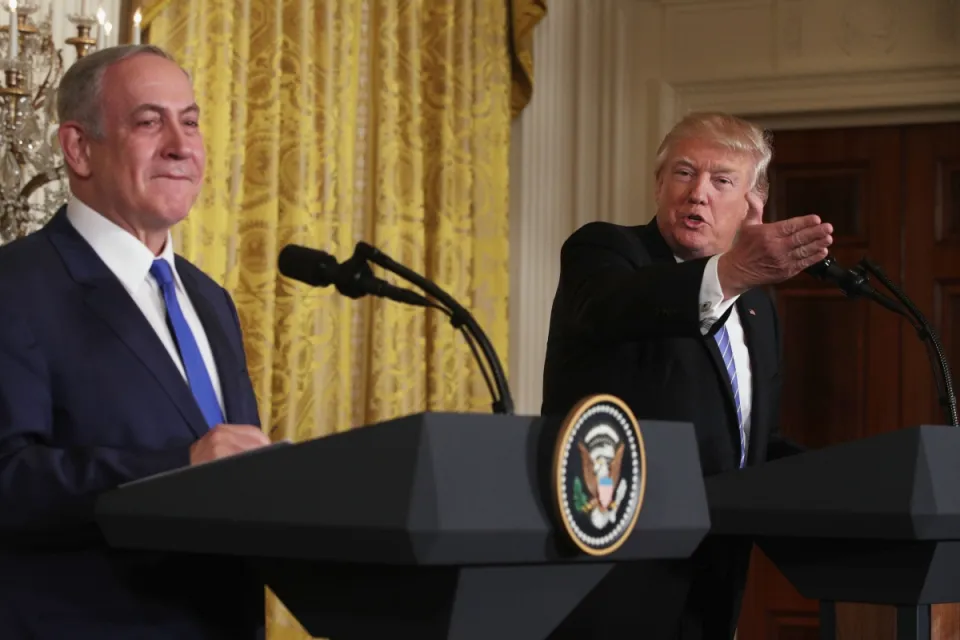By John Stapleton
Not content with reshaping America, US President Donald Trump is reshaping diplomacy throughout the world.
While the world’s diplomats are aflame with indignation over the seemingly ad hoc nature of Mr Trump’s foreign policy announcements, leading Australian policy experts suggest there could be a silver lining.
Mr Trump has called NATO obsolete, although it has been the bedrock of Western military alliance since World War II. He famously spoke on the phone to the Taiwanese President, throwing the One China policy up for grabs. He has been at clear odds with the Canadian Prime Minister Justin Trudeau, who has declared those fleeing war and terror will always be welcome in Canada. He is moving ahead with the wall between the US and Mexico, has jousted with the German leader and turned the relationship with Russia on its head.
On Thursday (AEST), he threw decades of diplomatic effort up in the air when he declared of the Palestine-Israel two-state solution: “I’m looking at two-state and one-state, and I like the one that both parties like.”
Related Coverage
Trump campaign aides had repeated contacts with Russian intelligence
Two state, One State, whatever … Trump re–writes US foreign policy on Israel
Donald Trump hits out at ‘fake media’, dodges press corps questions
Even in far-off Australia, he’s managed to insult Prime Minister “Trumble”.
One of Australia’s most experienced security advisers Allan Behm, author of the recent book No, Minister and former head of the International Policy and Strategy Divisions of the Department of Defence, argues that for all his iconoclastic bluster and rants against received wisdom, Mr Trump is forcing a re-examination of the alliances which have underpinned the West for 70 years.
“The best thing for friends and allies is they have had to review their position, and that is a good thing,” Mr Behm told The New Daily. “There is an upside when you have to test your fundamental assumptions. If the Prime Minister is going to get a bollocking every time he talks to the President, it is about time we thought about the alliance.”
What has upset much of the diplomatic and bureaucratic class worldwide – Mr Trump’s brazen contempt for established practice – is forcing America itself, along with its allies, to redefine exactly what their best interests are.
Professor of International Politics at the University of NSW Tony Burke told The New Daily the hostility or disdain between the Australian and US leaders was disturbing, “but if it makes us think about having an independent foreign policy, that is of benefit”.
“There has been a tendency to align too closely with Washington’s position on everything. We need to determine our own interests.”
Professor of History at the American University in Washington, Max Friedman, said of Mr Trump’s diplomatic efforts: “The most beautiful and classiest foreign policy ever”, before making it clear he was mimicking President Trump’s hyperbole.
The problem is we don’t know what Trump’s foreign policy is because he doesn’t seem to know.
“He has challenged convention without offering a coherent alternative. We don’t know if he values NATO or thinks it is obsolete. Is he recognising Taiwan or sticking with the One China policy? Does he support West Bank settlements or oppose them? He wants to obliterate ISIS, but is rattling sabres at Iran, the country doing the most to fight ISIS.”
Professor Rory Medcalf, head of the National Security College in Canberra, told The New Daily Mr Trump’s regular tweeting was compelling officials to invent policy on the run, all to fit in with his tweets. The US President hosted Japan PM Shinzo Abe last week. Photo: Getty
The US President hosted Japan PM Shinzo Abe last week. Photo: Getty
“That is unprecedented, that the most powerful man in the world has this way of circumventing his own system and the very, very powerful national security bureaucracy.”
But despite Mr Trump’s spectacular ability to ignore all traditional diplomatic practice, experts are united in thinking, or hoping, that the institutional strength and heavyweight machinery of traditional American governance will ultimately have a tempering effect on him.
As Mr Behm puts it: “The greatest positive I can draw out of it, is while everyone is recalibrating, Trump is learning on the job, and learning how to walk backwards. He has walked backwards on China, I think he will walk backwards on Mexico, he is already walking backwards on Canada.
“It is like AFL umpires, they do best when they are running backwards, otherwise they get knocked over and killed. Governments around the world are reappraising, while Trump is learning the hard lessons of being President.”
